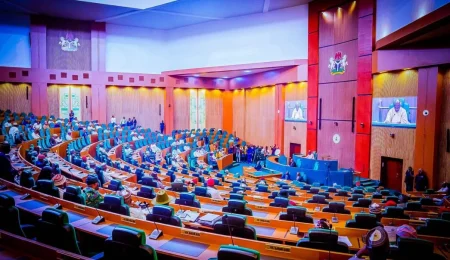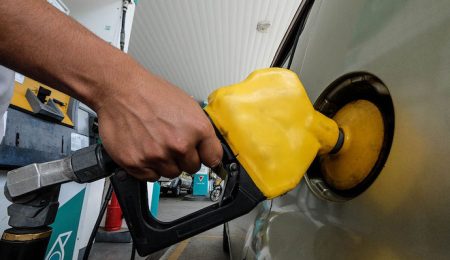Transparency Initiative (NEITI) on Thursday released its combined 2022 and 2023 independent oil and gas industry report, disclosing that outstanding collectible revenues due to the federal government in the sector as of June 2024 stood at $6.071 billion and N66.4 billion respectively.
A breakdown showed that the outstanding liabilities were $6.049 billion and N65.9 billion in unpaid royalties and gas flare penalties, due to the Nigerian Upstream Petroleum Regulatory Commission (NUPRC) as collectible revenues by August 31, 2024.
At the well-attended event in Abuja were captains of industry, top government functionaries, civil society organisations, heads of anti-graft agencies, among others.
They included: The Secretary to the Government of the Federation (SGF), George Akume; Chairman of the Economic and Financial Crimes Commission (EFCC), Olanipekun Olukoyede; Chief Executive of the Nigerian Financial Intelligence Unit (NFIU), Hafsat Bakari; Senate Committee Chair, Upstream Petroleum, among others.
The report also provided a detailed analysis of the information and data regarding who owes what in outstanding revenues due to the government.
A further breakdown showed outstanding petroleum profit taxes, company income taxes, withholding taxes, and Value Added Tax (VAT) due to the Federal Inland Revenue Service (FIRS) amounting to $21.926 million and N492.8 million as of June 2024.
On fuel importation, the latest NEITI report disclosed that a total of 23.54 billion litres of Premium Motor Spirit (PMS) or petrol were imported into the country in 2022, while 20.28 billion litres were imported in 2023.
This, it said, represented a reduction of 3.25 billion litres, or a 14 per cent decline, following the removal of the subsidy. A detailed 10-year trend analysis (2014–2023) in the NEITI report showed that the highest annual petrol importation into the country, 23.54 billion litres, was recorded in 2022, while the lowest, 16.88 billion litres, was recorded in 2017.
The NEITI report also disclosed that a total of N15.87 trillion was claimed as under-recovery or price differentials between 2006 and 2023, with the highest amount of N4.714 trillion recorded in 2022.
Fiscalised crude production in 2022 stood at 490.945 million barrels, compared to 556.130 million barrels produced in 2021, representing an 11 per cent decline.
However, in 2023, the NEITI’s independent report revealed total fiscalised production of 537.571 million barrels, a 46.626 million-barrel or 9.5 per cent increase from total production recorded in 2022.
Besides, a 10-year trend (2014–2023) of fiscalised crude oil production in Nigeria showed that the highest production volume of 798.542 million barrels was recorded in 2014, while the lowest, 490.945 million barrels, was recorded in 2022.
The NEITI report also provided detailed information and data on crude lifting. In 2022, total crude lifting was 482.074 million barrels compared to 551.006 million barrels lifted in 2021, it said.
In 2023, total crude lifting stood at 534.159 million barrels, representing an 11 per cent increase of 58.08 million barrels.
According to NEITI, a total of 7.68 million barrels of crude were either stolen or lost in 2023, representing a significant drop of 79 per cent (29.02 million barrels) compared to 36.69 million barrels either stolen or lost in 2022.
On overall revenue generation in the oil and gas industry, the report showed that material companies accounted for $15.549 billion or 96 per cent and non-material companies for $695.604 million or 4 per cent in revenues generated in 2022.
“In 2023, material companies accounted for $21.415 billion (95 per cent), and non-material companies accounted for $1.238 billion (5 per cent). The revenues came from 17 identified revenue streams, including proceeds from taxes, oil and gas sales, dividends from NLNG, royalty payments, signature bonuses, gas flare penalties, and concessions.
A total of 78 companies in the oil and gas industry and nine relevant government agencies that collect, keep custody, or manage oil and gas revenues were covered by the NEITI process.
Speaking at the public presentation of the report on Thursday in Abuja, the SGF, Akume, who also chairs the NEITI board, stated that NEITI reports have guided policy decisions, reforms, and measures that foster accountability, particularly in the oil and gas sector.
In a sector where opacity could easily lead to leakages, inefficiencies, and corruption, NEITI, he said, has become an indispensable partner in ensuring that Nigerians are fully aware of how their commonwealth is managed.
“ The data contained in this report will inform critical government decisions moving forward, especially as we continue to prioritise resource management, revenue mobilisation, and public accountability,” he stated.
In his remarks, the Executive Secretary of NEITI, Dr. Ogbonnaya Orji, explained that the preparation of the report followed a meticulous and transparent process in line with global Extractive Industries Transparency Initiative (EITI) standards.
“A rigorous, multi-stakeholder approach was adopted, involving extensive collaboration with government agencies, extractive companies, civil society, and indigenous consultants. We ensured that all data was collected, validated, and reconciled in an open and transparent manner,” Orji stated.
In his remarks, Chairman of the EFCC, Olukoyede pledged EFCC’s collaboration with NEITI to ensure that every kobo owed Nigeria is recovered .
He averred that where the work of NEITI stops, is where the work of EFCC begins, announcing that from NEITI’s past reports, EFCC recently recovered and remitted to the federal government coffers over N1 billion.
He gave an assurance that the current reports released by NEITI will be taken over by the EFCC for thorough and further investigations of its findings and recommendations.
Emmanuel Addeh
Follow us on:


